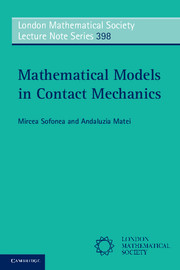Book contents
- Frontmatter
- Contents
- Preface
- I Introduction to variational inequalities
- II Modelling and analysis of contact problems
- 4 Modelling of contact problems
- 5 Analysis of elastic contact problems
- 6 Analysis of elastic-visco plastic contact problems
- 7 Analysis of piezoelectric contact problems
- Bibliographical notes
- List of symbols
- References
- Index
6 - Analysis of elastic-visco plastic contact problems
from II - Modelling and analysis of contact problems
Published online by Cambridge University Press: 05 October 2012
- Frontmatter
- Contents
- Preface
- I Introduction to variational inequalities
- II Modelling and analysis of contact problems
- 4 Modelling of contact problems
- 5 Analysis of elastic contact problems
- 6 Analysis of elastic-visco plastic contact problems
- 7 Analysis of piezoelectric contact problems
- Bibliographical notes
- List of symbols
- References
- Index
Summary
In this chapter we illustrate the use of the abstract results obtained in Chapter 3 in the study of quasistatic frictionless and frictional contact problems. We model the material's behavior either with a nonlinear viscoelastic constitutive law with short or long memory, or with a viscoplastic constitutive law. The contact is either bilateral or modelled with the normal compliance condition with or without unilateral constraint. The friction is modelled with Coulomb's law and its versions. For each problem we provide a variational formulation which is in the form of a nonlinear equation or variational inequality for the displacement or the velocity field. Then we use the abstract existence and uniqueness results presented in Chapter 3 to prove the unique weak solvability of the corresponding contact problems. For some of the problems we also provide convergence results. Everywhere in this chapter we use the function spaces introduced in Section 4.1 and the equations and boundary conditions described in Section 4.4.
Bilateral frictionless contact problems
In this section we study two frictionless contact problems for viscoelastic materials in which the contact is bilateral. The main feature of these problems consists of the fact that their variational formulation is in the form of a nonlinear equation for the displacement field, which is either evolutionary or involves a history-dependent operator. Therefore, the unique solvability of the models is proved by using the abstract results presented in Section 3.1.
Information
- Type
- Chapter
- Information
- Mathematical Models in Contact Mechanics , pp. 173 - 216Publisher: Cambridge University PressPrint publication year: 2012
